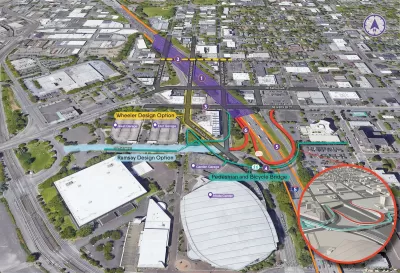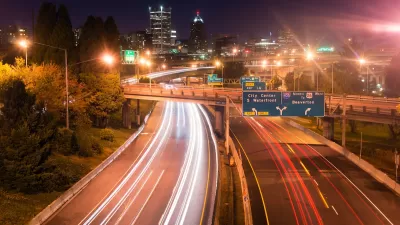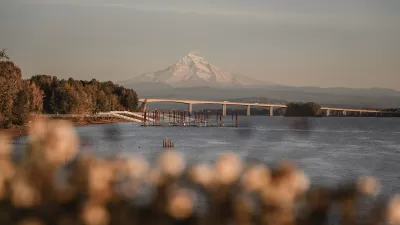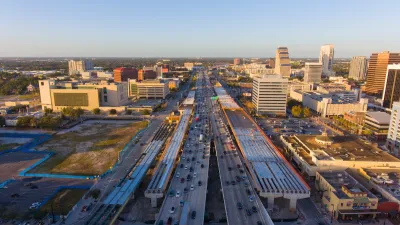The Oregon DOT is requesting a federal grant to fund a controversial freeway expansion through the Rose Quarter.

Environmental and sustainable transportation advocates in Portland, Oregon are urging federal officials to oppose a proposed expansion of the Interstate 5 freeway through the city’s Rose Quarter.
A grant being considered by the U.S. Department of Transportation (USDOT) could “make or break” the project, according to an article by Taylor Griggs in the Portland Mercury. “Freeway expansion opponents argue ODOT has concealed the true environmental costs of the Rose Quarter project in order to present it as a sustainable and equitable investment in Portland’s future. But their opposition to the grant award puts them at odds with local government officials and several community organizations, who have also written USDOT with letters of support.”
ODOT’s current plan involves new auxiliary lanes in both directions of the freeway. After years of backlash, the department agreed to sink the freeway and add new surface connections above. “ODOT says the cover will be able to support residential and commercial buildings, and will make it easier for people walking, biking, or rolling to get around. The project also includes a plan to build a pedestrian and bicycle bridge over I-5 near the Moda Center.”
Although it received a $450 million Reconnecting Communities grant, the cap plan, developed with “strong input” from community advocates, is largely unfunded and could cost up to $1.9 billion.
Advocates including Joe Cortright and Chris Smith, founders of No More Freeways, recommend that USDOT award a smaller, $400 million grant geared toward completing a proposed pedestrian and bike bridge. In a letter, Cortright and Smith said “the project is engineered to be vastly wider than needed,” doubling the width of the freeway. “Ultimately, advocates from groups like No More Freeways say the RCN program cannot coexist with a USDOT that doles out federal funding to polluting, harmful freeway expansions.”

Alabama: Trump Terminates Settlements for Black Communities Harmed By Raw Sewage
Trump deemed the landmark civil rights agreement “illegal DEI and environmental justice policy.”

Planetizen Federal Action Tracker
A weekly monitor of how Trump’s orders and actions are impacting planners and planning in America.

The 120 Year Old Tiny Home Villages That Sheltered San Francisco’s Earthquake Refugees
More than a century ago, San Francisco mobilized to house thousands of residents displaced by the 1906 earthquake. Could their strategy offer a model for the present?

In Both Crashes and Crime, Public Transportation is Far Safer than Driving
Contrary to popular assumptions, public transportation has far lower crash and crime rates than automobile travel. For safer communities, improve and encourage transit travel.

Report: Zoning Reforms Should Complement Nashville’s Ambitious Transit Plan
Without reform, restrictive zoning codes will limit the impact of the city’s planned transit expansion and could exclude some of the residents who depend on transit the most.

Judge Orders Release of Frozen IRA, IIJA Funding
The decision is a victory for environmental groups who charged that freezing funds for critical infrastructure and disaster response programs caused “real and irreparable harm” to communities.
Urban Design for Planners 1: Software Tools
This six-course series explores essential urban design concepts using open source software and equips planners with the tools they need to participate fully in the urban design process.
Planning for Universal Design
Learn the tools for implementing Universal Design in planning regulations.
Clanton & Associates, Inc.
Jessamine County Fiscal Court
Institute for Housing and Urban Development Studies (IHS)
City of Grandview
Harvard GSD Executive Education
Toledo-Lucas County Plan Commissions
Salt Lake City
NYU Wagner Graduate School of Public Service





























